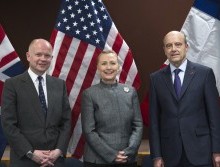Major world and regional actors agreed on Saturday to support a Syrian political transition plan presented by United Nations envoy Kofi Annan that aims to end the nation’s bloody conflict. Yet while the plan calls for a new inclusive interim government to oversee a shift to democracy, the fate of President Bashar al-Assad and what will happen if the regime rejects the plan remain unclear.
According to a copy of the joint communiqué released on the United Nations website, the plan calls for a “transitional governing body” with full executive powers. It does not explicitly rule out specific persons who can participate in such a government, such as Assad.
Said the joint communiqué, “It could include members of the present government and the opposition and other groups and shall be formed on the basis of mutual consent.”
It appears that clarifying the “mutual consent” clause is likely to be a point of division between the United States and Russia, who have sharply disagreed on how to respond to the Syrian crisis. According to Al Jazeera, Russia objected to language in a previous version of the statement that was interpreted by Moscow as preventing Assad from being part of the transitional government.
However, US Secretary of State Hillary Clinton, in comments released by the US State Department, said that “Assad will still have to go. He will never pass the mutual consent test, given the blood on his hands.”
According to Clinton, the statement—agreed upon on Saturday by the US, France, the UK, Russia, China, Germany, Iraq, Turkey Kuwait and Qatar—sends a unified statement to Assad.
“Every day that has gone by without unity on the [UN] Security Council and among the states gathered here has been a day that has given comfort to Assad and his cronies and supporters,” said Clinton. “What we have done here is to strip away the fiction that he and those with blood on their hands can stay in power. The plan calls for the Assad regime to give way to a new transitional governing body that will have full governance powers.”
Russian Foreign Minister Sergei Lavrov, meanwhile, reiterated their demand that a solution not be imposed on Syria. RIA Novosti quoted Lavrov as saying, “We consider it to be of key importance that there is no attempt in the document to impose upon the Syrian side any kind of transitional process.”
It remains unclear what will happen if the Syrian regime or opposition rejects the plan, aside from international pressure and influence. Clinton said, “We and our partners made absolutely clear to Russia and China that it is now incumbent upon them to show Assad the writing on the wall.”
She further noted her belief that the UN Security Council should back the plan with “real consequences” such as UN sanctions if it is not put into effect. She highlighted the urgency of the situation by saying that more 700 people were killed in the conflict last week alone.
The Syrian conflict began more than a year ago as a brutal regime crackdown on peaceful protests opposing Assad. However, the opposition has grown increasingly militant and the government response has included alleged massacres and shelling of residential areas. There are concerns the conflict is heading towards a full-fledge civil war.
The Annan transition plan addresses matters beyond creating a new government, including humanitarian concerns and that all parties to implement an “immediate cessation of violence” that will create an atmosphere conducive to the political transition.
(By Joshua Spurlock, www.themideastupdate.com, July 1, 2012)

